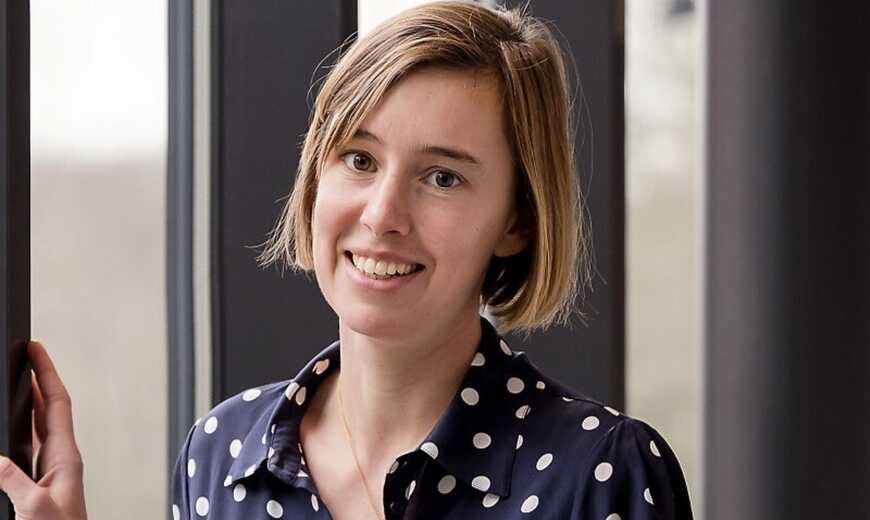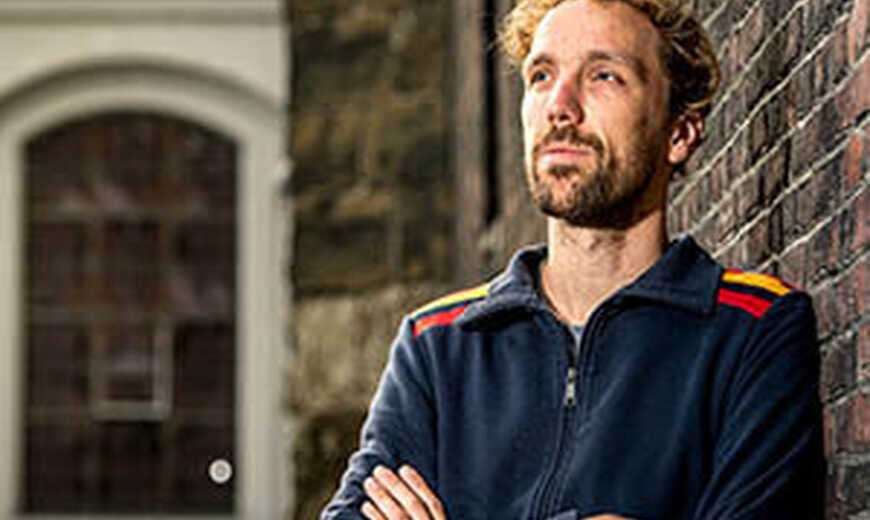Interviewer: Congratulations on being awarded the BAPS early career price last month ! In retrospect, what are the important steps in your career that have made it possible to be so successful today?
Jozefien De Leersnyder: That’s a difficult question, since I have the feeling that where I am now is not so much the result of conscious steps that I took, but rather of a mixture of things that made me lucky to bring me here. It’s a bit like cooking: there are some key ingredients, but you don’t always know in advance which one is most important to give the dish it’s distinct delicious flavor. For me, the main key ingredient throughout my trajectory was and is to really follow my heart and research interests, to work on the topics that I really care about and that I believe may make a difference for science and society. Another key ingredient is that I have been really well surrounded by very supportive and inspiring mentors and colleagues who did not create a competitive atmosphere, but one in which people try to get the best out of each other.
A third key ingredient was the opportunity to go abroad – a few months to Stanford during my PhD and three years in Amsterdam as an Assistant Professor. These experience not only provided insight into how other groups work and science or education can be organized differently, but also helped me to improve and articulate my own way of thinking, discover new topics, and establish international networks. Another point is the connection to society. My collaborations with NGOs who put our scientific evidence into practice and my work at the Young Academy are really important to me as they remind me why I’m actually doing this hard work in science: to make the world a slightly better place, one scientific insight and application at a time.
I believe the last ingredient is just luck: being the right person, at the right time, at the right place… It can be frightening to realize how important luck is in an academic career. But actually, it is also comforting: given that you don’t control everything, you should not give up on spending time with your family, your friends, hobbies, other projects …that’s also why I work only 80%. These are the things that keep you going and that provide you with the energy you need to give the best of yourself and to stay internally motivated until the day you’re lucky to land an academic position or the day you realize that your PhD can also land a truly meaningful job outside academia.
Interviewer: What is your main research interest?
JDL: At the most broad level, I’m interested in how the mind interacts with its context – that are, the meanings and practices that are prevalent in its surrounding society, ethnic cultural communities, school or organization? At a mid-level I would say that I aim to uncover, given our diverse society, how can we ensure all people to thrive? In one research line, I focus on how schools deal with ethnic-cultural diversity and how that may impact the belonging and achievement of the pupils. In my main research line, on psychological acculturation, I focus on how psychological processes like emotion, self-construal, cognition, etc. change upon being immersed in a different context. During my PhD and post-doc I looked at acculturative changes in emotion and their consequences for well-being and societal thriving. Now, we’re studying the acculturation of self-construal and its consequence for school achievement.
What we keep on finding in this latter research line is that the key drivers of acculturative change aren’t to be sought in minoritized individuals’ willingness to be part of their mainstream or heritage cultures, but in meaningful encounters with people from different backgrounds. This implies that acculturation may entail much more than the changes in attitudes and identities that have been the core focus in the literature until now, yet also that different domains of the psyche may acculturate at different rates or in different directions – acculturation or ‘integration’ may thus occur ‘under the skin’ and is thus non monolithic.
The advantage of studying processes of change is it may provide hints at the underlying mechanisms. Because contact seems to be key for emotional acculturation, we are currently investigating the possible micro-processes that may occur in intercultural interactions and that may account for emotional change. We do so by bringing unfamiliar Dutch and Turkish/Moroccan Dutch adolescents together in a field lab where they engage in a one-hour structured interaction that encourages them to have meaningful exchanges about emotional situations and, as such, establish or expand their common ground. We videotape these interactions, code for the process of grounding and then link this to changes in how they think and feel about these situations. In doing so, we aim to make visible how cultural meanings are negotiated and emerging in interactions and how an agreement on a particular outlook on the world may shape individual’s subsequent thoughts and emotions .
Interviewer: You’ve also made attempts to valorise your scientific work in the real world. What does it bring you as a scientist?
JDL: My underlying drive to be a scientist is not for science itself, but because I really believe that good science can improve society. It’s one of the main reasons I embarked on a PhD-trajectory instead of working for an NGO or so.
This goal to give back to society became concrete five years ago. I attended a royal academy (KVAB) thinker’s program on diversity and after my presentation, the chairman of an NGO – School Zonder Racisme – came to me saying that the scientific insights I was bringing to the table could really guide schools in their search for how to best deal with diversity. From that moment onward, we started thinking about synergies and created an evidence based intervention project together for which we obtained European funding. As researcher, it’s impossible to make a difference on society on your own. Of course, I can design interventions for teachers based on theoretical insights and empirical evidence, but I can’t go in schools by myself. On top of that, I don’t have first-hand experience with schools’ everyday difficulties. So, people who work in schools have a lot of complementary know-how as well as specific needs and goals we all need to take into account to create successful interventions. I thus truly believe the best combination is when there is a match between the needs of the public actors and the knowledge of the scientists, as well as trust and respect for each other’s insights. All in all, this collaboration really shaped me and my work as it really motives me to do the science and provides novel questions as well as insights that can only stem from everyday practice.
Interviewer: You’ve also been involved in the public debate. What do you wish you had known before you started doing so? What would you advice young scholars wishing to become involved in it?
JDL: For valorization collaborations, my advice would be to really look for the synergies like the one I was lucky to find. If you, as a researcher want to push your research agenda onto an organization, I think the collaboration is doomed to fail. Try to really listen, really understand what your interlocutor means, get acquainted with their vocabulary, their needs, and see if you can answer those. It’s possible that when I started, I talked too much, and forgot to listen. Now that balance is better, but I have to remind myself that we speak another language and may have different primary goals.
For becoming involved in public debates in the media, the advice I would like to share is: pick your battles. If you participate in the public debate, people might sometimes write things that are offensive about yourself, or about your science. My philosophy is to let go of the personal attacks – which is hard ! But I do answer when people attack my science, because I truly believe that the scientific method we use raises insights that are more than just ‘another opinion’.
Interviewer: What are the novelties and main challenges in your field nowadays?
JDL: One thing that I’m really excited about, and that I see appear in top journals nowadays, are studies designed to test some actual interventions. For example, WISE interventions, that are based on precise theory and evidence and that are designed to shift people’s mindsets about themselves, others, or any social situation, are now being evaluated. As a PhD student, I rarely saw such intervention studies. So I’m very happy that social psychology is not only again valuing but also empirically evaluating the words of Kurt Lewin: “There is nothing so practical as a good theory”.
A remaining challenge I think for our field of psychology as a whole is to find a good balance between the urge to be novel by showcasing things that no one else has done before – which we know might create research that is very difficult to replicate – and just “doing what has been done” without questioning the tools we use. I believe the field will still grow if we address this challenge and find a good balance between the two.
Meet the lab: Interview with Jozefien De Leersnyder (KULeuven)
Written by Tim VantilborghSimilar articles
All articles
Meet the lab series: Interview with Prof A. Calcus
Discover the intriguing world of auditory cognitive neuroscience with Prof. A. Calcus in this exclusive interview, where she delves into her ERC starter grant project, exploring adolescence as a potential sensitive period for auditory processing development. Get inspired by her insights on academic careers, multidisciplinary research, and the societal impact of psychological science.
Read more
Meet the lab series: Interview with Dr. D. Stawarczyk
David Stawarczyk shares insights on his innovative research in mind wandering and the dynamic nature of cognition, combining subjective experiences with advanced neuroscientific methods. Discover his unique approach and valuable advice for aspiring researchers in this compelling interview.
Read more
Meet the lab: Interview with Dr Stijn Van Petegem (ULB)
This interview is part of the meet the lab series and was published in our October 2021 newsletter.
Read more